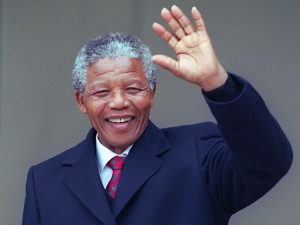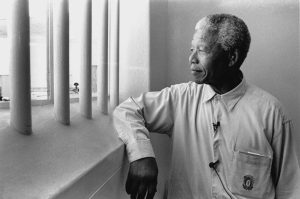Introdução
Sabe aquelas histórias que a gente lê e pensa: “Uau, isso é coisa de filme!”? A vida de Nelson Mandela é exatamente assim. Em 18 de julho, o mundo todo celebra o Dia Internacional Nelson Mandela, uma data que vai muito além de uma simples homenagem. É um convite poderoso para a gente refletir sobre a força da persistência, da igualdade e da justiça. Mas quem foi esse ícone que passou décadas lutando e se tornou um símbolo global de transformação? E o mais legal: o que a jornada dele tem a ver com o seu aprendizado de inglês? Vem com a gente desvendar essa conexão inspiradora!
📖 Aqui você encontra…
clique para verNível: B1
Objetivo: Comemorar o Dia Internacional Nelson Mandela, apresentando sua biografia e legado, e conectar sua história de luta e as mensagens de suas frases icônicas ao aprendizado de inglês, focando em vocabulário e retórica para discussões sobre justiça social.
Tópicos gramaticais abordados nesse texto:
- Past Simple: Para narrar a vida e os feitos de Nelson Mandela (“Nelson Mandela was born in 1918”, “He spent 27 years in prison”, “he became the first Black president”).
- Present Simple: Para descrever fatos e a relevância atual do legado de Mandela (“Mandela Day invites people”, “Education is the most powerful weapon”).
- Vocabulary for Social Justice & Leadership: Termos como apartheid, racial segregation, justice, equality, human rights, resilience, compassion.
- Conectivos de Causa e Consequência: Para explicar relações entre eventos e ideias (“because a strict system…”, “That’s why Mandela Day is so closely connected”).
- Uso de Citações: Para reforçar mensagens e demonstrar a força da linguagem.
- Conceitos de Retórica e Persuasão: Abordados na parte sobre “Formal and persuasive speech”.
Escute aqui a transcrição:
Easy
Advanced
From Prisoner to President
Nelson Mandela was born in 1918 in South Africa, where a strict system of racial segregation called apartheid divided the country. Black South Africans were denied basic rights, and speaking out came at a cost. Mandela chose to fight against this injustice — and spent 27 years in prison for doing so.
After his release in 1990, instead of calling for revenge, Mandela called for peace and unity. In 1994, he became the first Black president of South Africa. His leadership wasn’t just historic — it was transformative. He showed the world that forgiveness is a form of strength and that real change starts with compassion.
What Makes Mandela a Global Symbol?
Mandela’s life is more than history — it’s a lesson in resilience, courage, and purpose. He once said:
“Education is the most powerful weapon which you can use to change the world.”
That’s why Mandela Day is so closely connected to schools, learning, and action. It’s not about remembering the past; it’s about building a better future.
And what better way to honor that than by learning something new?
Mandela and the English Language
Nelson Mandela spoke fluent English, and many of his speeches are studied today for their clarity, emotional power, and moral strength. For English learners, reading or listening to his words is a great way to practice:
-
Formal and persuasive speech
-
Rich vocabulary for social justice
-
Powerful rhetorical structures
For example:
-
“It always seems impossible until it is done.”
-
“I am not a saint, unless you think of a saint as a sinner who keeps on trying.”
These quotes don’t just teach vocabulary , they teach values.

A Fun Fact: What Is the Mandela Effect?
Ever heard of the Mandela Effect? It’s a term used to describe a phenomenon where many people remember something that didn’t actually happen, like remembering Nelson Mandela dying in prison in the 1980s, even though he lived until 2013. This widespread false memory gave the phenomenon its name. Other examples include people misremembering the spelling of “Febreze” or thinking the Monopoly man has a monocle. It’s a fascinating blend of psychology, memory, and pop culture, and a great conversation starter in any English class!

What Can You Do on Mandela Day?
Mandela Day is not just about admiration, it’s about action. Whether it’s helping a neighbor, donating to a cause, or simply being kind, every small gesture counts. You can also take this opportunity to:
-
Watch a documentary about Mandela’s life (great listening practice!)
-
Learn vocabulary related to human rights and social justice
-
Reflect on how language can be a tool for change, just like Mandela used it
By doing this, you’re not just improving your English, you’re becoming a more aware, active, and compassionate global citizen.
Aprender inglês também é uma forma de mudar o mundo
Na Apollo Academy, acreditamos que aprender um novo idioma pode abrir portas para a carreira, para o autoconhecimento e até para entender melhor as vozes que moldaram o mundo.
Quer aprender inglês de forma consciente e significativa? Fale com a gente e descubra um método que vai além da gramática. Vamos crescer juntos, como cidadãos do mundo.
Are You Experiencing a “Mandela Effect” Moment Right Now?!
You think you remember things a certain way, but do you really? Let’s see if your memory is playing tricks on you, just like the famous “Mandela Effect”!
What do you remember about the popular children's book series "Berenstain Bears"?

Think about the famous line from the movie Star Wars: Episode V – The Empire Strikes Back. What does Darth Vader say?

How do you recall the Monopoly man's appearance?

What is your memory of the popular cereal, "Fruit Loops"?

Remember the famous scene in Snow White and the Seven Dwarfs. What does the Evil Queen say to her mirror?

When you think of the famous chocolate bar "Kit Kat," how is the name written?

What do you remember about Pikachu's tail from Pokémon?








